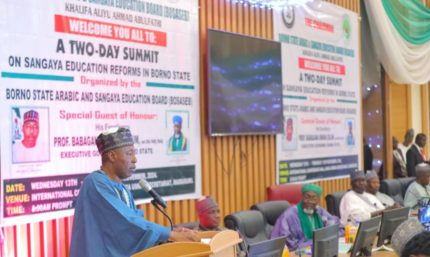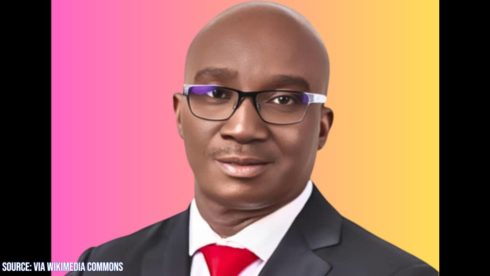Borno State Governor, Babagana Zulum, officially inaugurated a summit dedicated to reforming the Almajiri education system, a traditional Islamic form of learning commonly practiced across northern Nigeria. The summit, held at the Musa Usman Secretariat’s conference hall, brought together a wide range of stakeholders, including education leaders, religious authorities, and community advocates, with the aim of developing strategies to improve the integration of the Almajiri system into the formal educational framework.
Governor Zulum emphasized the importance of reforming the Almajiri system to combat insecurity and promote inclusive education in the state. He highlighted the urgent need to ensure that young Almajiri students receive a balanced education that includes both Islamic teachings and essential skills for personal and professional development, enabling them to contribute positively to society.
Governor Zulum Addressing Security Concerns Through Education
Governor Zulum connected the lack of structured education within the Almajiri system to the rise of insecurity in the region, including the emergence of groups like Boko Haram. He pointed out that unregulated teachings and the absence of formal education have made many youths vulnerable to extremist ideologies. By reforming the system, the government hopes to curb these influences and create a more secure and prosperous Borno State.
The governor Zulum further explained that the Borno State Government has established the Arabic and Sangaya Education Board to oversee this reform process. This board will implement a unified curriculum for Sangaya and Islamic schools, ensuring that Almajiri students receive structured, balanced education that addresses both their spiritual and secular needs.
Introduction of Higher Islamic Colleges and Vocational Training
As part of the reform, the state plans to establish Higher Islamic Colleges specifically for Almajiri children. These colleges aim to blend religious studies with secular subjects, such as vocational training, literacy, and numeracy, to provide Almajiri students with skills that will enhance their future employment prospects. Governor Zulum stated that the reform introduces an integrated educational model that incorporates vocational training within Almajiri centers to ensure that students gain valuable life skills.
Zulum remarked, “The Sangaya Reform is a significant step towards providing Almajiri children with better life chances. By integrating western education and vocational skills, we are equipping them with the tools needed for a successful future.” He underscored that these reforms are designed to streamline informal education pathways, making them viable for further education and opportunities, including admission into colleges and universities.
Stakeholder Support and Calls for Comprehensive Reforms
The chairman of the Borno State Arabic and Sangaya Education Board, Shiekh Arabi Abulfatahi, expressed his appreciation to Governor Zulum for his dedication to the board’s mission and support in reshaping the Almajiri educational landscape. He highlighted the governor’s commitment to ensuring that Almajiri children receive quality education that prepares them for meaningful roles in society.
Guest speakers at the summit, including Professor Mustapha Gwadabe of Ahmadu Bello University, Zaria, and Professor Mohammed Alhaji from the University of Maiduguri, echoed the need for a comprehensive overhaul of the Almajiri system. Both professors called for continued collaboration among stakeholders to achieve a balanced and sustainable educational framework that respects traditional Islamic teachings while equipping students with skills for modern life.
Public Reactions and Social Media Response
Governor Zulum’s initiative has generated significant social media engagement, with users on X (formerly Twitter) expressing a range of opinions. Many praised the governor for his bold steps toward reform, while others offered constructive critiques. One user, @TimerX, expressed optimism, stating, “Finally, they’re doing what’s right. I wonder what took them so long. Hopefully, this model inspires other states.” Another user, @IderaEbbang, commented on the need for modernization, writing, “The concept of Almajiri was about seeking knowledge by traveling. It’s absurd and outdated in today’s technological age.”
The reform has also sparked calls for stricter regulations on Almajiri teachers, or mallams, and on dormitory conditions. Social media user @AliyuX encouraged authorities to hold Almajiri schools accountable: “If a mallam cannot provide food for his students, he should send them home. And if found guilty of negligence, he should face the law.” This robust online dialogue indicates strong public interest in the potential impact of Zulum’s initiative on educational and social reform across the northern region.
Governor Zulum’s summit on Almajiri education marks a pivotal moment for Borno State, as the governor’s initiative seeks to provide youth with the education and skills needed to thrive in a diverse society. With support from religious leaders, educators, and the public, this reform has the potential to become a model for other states in Northern Nigeria, creating a lasting legacy of progress in the region.
Table of Contents
Discover more from OGM News NG
Subscribe to get the latest posts sent to your email.














